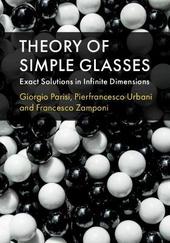
|
Theory of Simple Glasses: Exact Solutions in Infinite Dimensions
Hardback
Main Details
| Title |
Theory of Simple Glasses: Exact Solutions in Infinite Dimensions
|
| Authors and Contributors |
By (author) Giorgio Parisi
|
|
By (author) Pierfrancesco Urbani
|
|
By (author) Francesco Zamponi
|
| Physical Properties |
| Format:Hardback | | Pages:349 | | Dimensions(mm): Height 253,Width 178 |
|
| Category/Genre | Materials science |
|---|
| ISBN/Barcode |
9781107191075
|
| Classifications | Dewey:530.413 |
|---|
| Audience | | Postgraduate, Research & Scholarly | | Undergraduate | |
|---|
| Illustrations |
Worked examples or Exercises; 3 Tables, black and white; 6 Halftones, black and white; 42 Line drawings, black and white
|
|
Publishing Details |
| Publisher |
Cambridge University Press
|
| Imprint |
Cambridge University Press
|
| Publication Date |
9 January 2020 |
| Publication Country |
United Kingdom
|
Description
This pedagogical and self-contained text describes the modern mean field theory of simple structural glasses. The book begins with a thorough explanation of infinite-dimensional models in statistical physics, before reviewing the key elements of the thermodynamic theory of liquids and the dynamical properties of liquids and glasses. The central feature of the mean field theory of disordered systems, the existence of a large multiplicity of metastable states, is then introduced. The replica method is then covered, before the final chapters describe important, advanced topics such as Gardner transitions, complexity, packing spheres in large dimensions, the jamming transition, and the rheology of glass. Presenting the theory in a clear and pedagogical style, this is an excellent resource for researchers and graduate students working in condensed matter physics and statistical mechanics.
Author Biography
Giorgio Parisi is a Professor of Physics at the Universita degli Studi di Roma 'La Sapienza', Italy. His research is broadly focused on theoretical physics; from particle physics to glassy systems. He has been the recipient of numerous awards, including the Boltzmann Medal, the Enrico Fermi Prize, the Max Planck Medal, the Lars Onsager Prize and an ERC advanced grant. He is president of the Accademia dei Lincei and a member of the collaboration 'Cracking the glass problem', funded by the Simons Foundation. Pierfrancesco Urbani is a CNRS researcher. His research activity focuses on statistical physics of disordered and glassy systems. After a joint Ph.D. between Sapienza University of Rome, Italy and Universite Paris-Sud, France, he joined the Institut de Physique Theorique of CEA, first as a post-doctoral researcher and then as a permanent researcher. Francesco Zamponi is a Centre national de la recherche scientifique (CNRS) Research Director and an Associated Professor at Ecole Normale Superieure, Paris. His research is broadly focused on complex systems, ranging from glasses to agent-based models for macroeconomy. He has been awarded an ERC consolidator research grant and he is a member of the collaboration 'Cracking the glass problem' funded by the Simons Foundation.
Reviews'In this advanced textbook, the authors, all solid-state physicists, present a theory of simple glasses, defined as collections of interacting point particles. The approach, based on statistical mechanics and concepts of multiple-state metastability, is rigorous and educational. Derivations are careful and detailed ... An especially useful and educational feature is that each chapter includes a resume of main results and an annotated short bibliography geared to beginning students. An extensive, up-to-date bibliography at the end mainly draws from the Physical Review literature and related journals. Minimally indexed (no entries on shear stress or strain, viscosity, temperature, or spheres), the book is oriented toward advanced undergraduates or beginning graduate students (who will need preparation in statistical mechanics and liquid theory) and researchers in glasses, essentially addressing the solid-state physics and statistical mechanics communities.' J. Lambropoulos, Choice
|